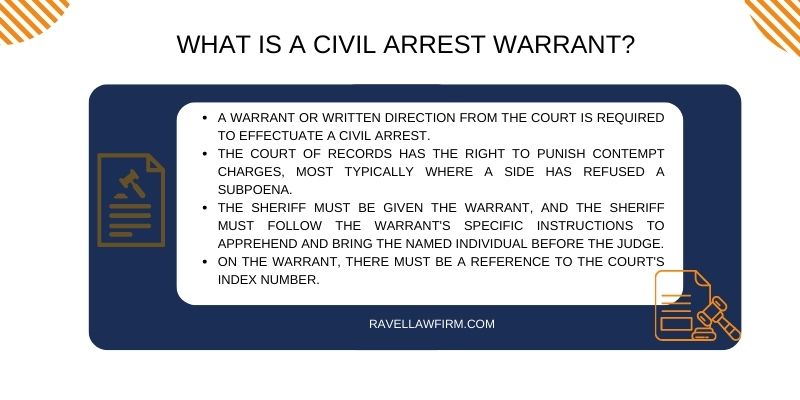Civil Warrants, as opposed to felony warrants, are typically issued at the request of a person who has filed a civil summons. Although defendants are served with these warrants, they are not often arrested warrants. Instead, they are typically issued in connection with a monetary judgment between two parties.
A Warrant or written direction from the court is required to effectuate a Civil Arrest. The court of records has the right to punish contempt charges, most typically where a side has refused a subpoena. The Sheriff must be given the Warrant, and the Sheriff must follow the Warrant’s specific instructions to apprehend and bring the named individual before the judge. On the Warrant, there must be a reference to the court’s index number.

See Also: What Is a Ramey Warrant?
Civil Bench Warrant
A court may order a bench warrant in a civil matter, even though most civil cases do not lead to an arrest warrant. The court’s bench warrant might be issued when a defendant fails to appear. This typically happens in civil cases when a plaintiff or witness ignores a subpoena. A law enforcement officer may make an arrest based on a bench warrant if one has been issued.
Who Files a Civil Warrant?
A civil warrant is a legal document that a plaintiff submits to the court clerk. The plaintiff must additionally fill out a specific form known as a “Civil Warrant.” The plaintiff must fill out both sides of the civil warrant, which is a two-sided form.
The plaintiff must submit one original warrant and one duplicate per defendant to the civil judicial officer. An individual does not have to pay anything to have a civil warrant issued.
Also Check: How to Get a Fugitive Warrant Lifted?
FAQ’s
What is a Civil Warrant in California?
A Civil Bench Warrant California is a judicial order ordering a California sheriff to apprehend and bring an individual before the court for a hearing.
How long does a Bench Warrant last in California?
Until they are addressed, they will show up on your record. Warrants issued by the bench do not run out of time. Judges issue these warrants, and if they expire, people might be more likely to try to avoid the justice system for a specific time.
Can you go to jail with a civil case?
In a criminal case, the defendant may be sentenced to jail time. However, in a civil case, the issue may be settled economically or through the mediation of a dispute.

Hi, I’m Brian Gary; I have my Doctor of Juridical Science (SJD) degree from SMU Dedman School of Law in Dallas. Over the years, I have dealt with many families and successful corporate Legal cases. I have counseled many people on legal matters, and along with my profession, I write about Law on my blog. Please feel free to contact me for counseling/case discussion; I’ll be happy to help you.